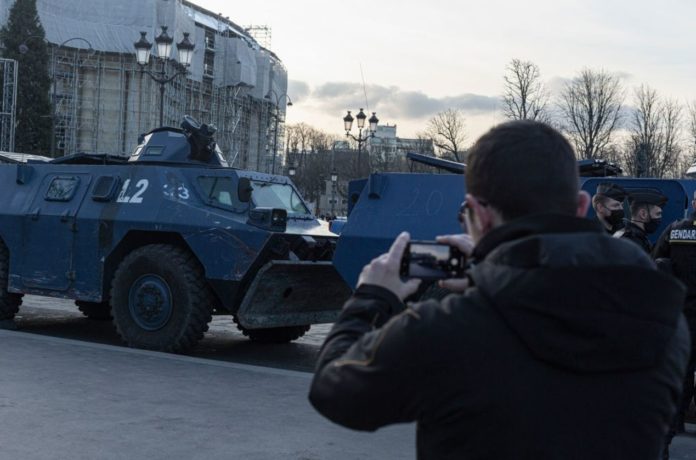For the first time since the “yellow vest” protests at the end of 2018, gendarmerie armoured vehicles have been deployed in the streets of the city.
Anti-Covid-19 demonstrators camped outside Paris early on Saturday morning after driving from across France in convoys.
They planned to enter the city despite a ban imposed by officials who are adamant about preventing any blockade of the capital.
“Over the next three days” nearly 7,200 police and gendarmes will be “deployed to enforce the ban on vehicle convoys,” said Paris police headquarters.
Didier Lallement, the prefect of the Paris police, claimed they had set up a temporary car pound that, along with hundreds of tow trucks, would “put an end to any blockage.”
On Twitter, police flaunted their anti-blockade armament, posting photos of loader tractors used to remove barricades, as well as trucks equipped with cranes or water cannon.
For the first time since the “yellow vest” protests at the end of 2018, gendarmerie armoured vehicles have been deployed in the streets of the city.
Prime Minister Jean Castex has vowed to stick to his guns.
“If they block traffic or if they try to block the capital, we must be very firm about this,” he insisted on France 2 television channel on Friday.
Anti-Covid-19 vaccine activists, as well as others unhappy about rapidly rising energy prices, have been inspired by Canadian truckers paralyzing border traffic with the United States.
Hundreds of cars, motorhomes, and vans from Lille, Strasbourg, Chateaubourg, and other cities gathered outside the Paris gates on Friday evening, but no convoy had entered the capital, according to a police source.
They want the government’s vaccine pass, which is necessary for admission to many public venues, to be removed, as well as additional assistance with their energy costs.
“People need to see us and listen to the people who just want to live a normal and free life,” Lisa, a 62-year-old retired health worker who joined a convoy of over 1,000 vehicles that left Chateaubourg in western Brittany early on Friday, said.
Lisa, like other demonstrators, was involved in the “yellow vest” movement, which began as a response to a fuel tax hike but quickly expanded to include other grievances against President Emmanuel Macron.
Macron said on Friday that he understood the “fatigue” associated to the Covid-19 outbreak, which comes just two months before presidential elections and with the administration trying to prevent violent scenes in the capital.
“This fatigue also leads to anger. I understand it and I respect it. But I call for the utmost calm,” he told the Ouest-France newspaper.
‘It’s a betrayal’
By Friday afternoon, police believed that 3,300 vehicles were involved in the numerous convoys.
Protesters who attempted to obstruct roadways would face fines or jail, according to Paris police, who feared “public order disturbances.”
The decision preventing the formation of convoys was upheld by the courts on Friday, after two appeals were dismissed.
“It’s a betrayal. The basis of the order is not respectful of the law, of the freedom to demonstrate,” anti-vaccine and “yellow vest” activist Sophie Tissier told AFP.
“The right to demonstrate and to have an opinion are a constitutionally guaranteed right in our republic and in our democracy. The right to block others or to prevent coming and going is not,” the prime minister said.
The activists, who denied any intention of blocking the capital, were expecting to join the customary Saturday protests against the government’s vaccine push.
“It’s important that we don’t interfere with other people on the roads,” said one activist, Robin, on his way from Illkirch-Graffenstaden in the eastern Alsace region. “That way we’ll keep the population on our side, like they did in Canada.”
Some demonstrators plan to travel to Brussels for a “European convergence” of protesters on Monday.
Phil, a 58-year-old truck driver from Brittany, said his unwillingness to get vaccinated had caused “upheaval” in his personal and work relations.
“When you join a demonstration you feel less alone,” he told AFP.
The administration has expressed sympathy for the demonstrators, with spokesman Gabriel Attal attributing their outrage to “fatigue and weariness” as a result of the long-term Covid-19 limitations.
On Friday, the administration announced a further relaxation of the Covid-19 regulations.
Image Credit: Getty
You were reading: Nearly 7,200 police and armoured vehicles deployed in Paris as COVID protest approaches capital
